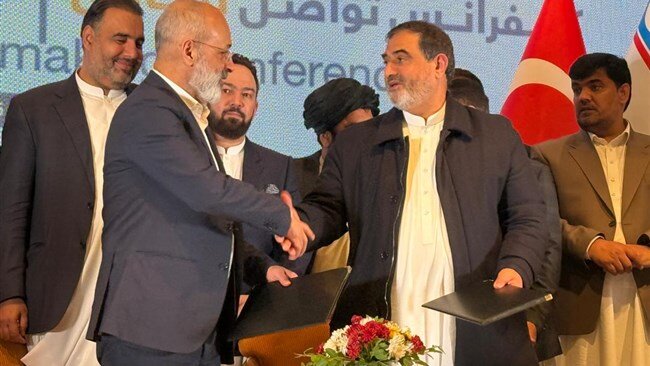Iran expands economic ties with Afghanistan with new trade, mining, energy initiatives

TEHRAN – Senior representatives from Iran’s Chamber of Commerce, Industries, Mines and Agriculture (ICCIMA) and multiple Afghan economic bodies signed a series of cooperation agreements during a high-level visit to Kabul and the Imam Abu Hanifa International Exhibition, signaling a broad effort to expand trade, investment and technical collaboration across mining, agriculture, energy and healthcare.
At the exhibition’s second day, ICCIMA Deputy Head Qadir Qiyafeh and Karim Hashemi, head of Afghanistan’s Chamber of Commerce and Investment, signed a cooperation agreement aimed at raising bilateral trade and strengthening institutional ties between the two chambers.
A separate agreement valued at $100 million was concluded between Mohammad Reza Salehi, head of Iran’s Energy Federation, and Habibi, chairman of Afghanistan’s Union of Construction Companies, covering a five-year cooperation framework. Another deal was signed to construct a 100-megawatt solar power plant worth $40 million by an Iranian energy developer.
Plans for a cross-border mineral processing hub
During his visit to Afghanistan, Qiyafeh met the country’s Minister of Mines and Petroleum, Hedayatullah Badri, where both sides discussed a proposal to establish a joint processing center at the border to refine Afghan minerals using Iranian technology and expertise.
The ICCIMA deputy head said Afghanistan’s vast mineral reserves require high-level exploration and modern processing capabilities to unlock value.
He said Iranian companies possess long-standing industrial expertise, particularly in steel and mining technologies, which could be transferred to Afghan partners.
Qiyafeh proposed creating a joint mining committee between private-sector operators from both countries to coordinate exploration, investment planning and long-term strategy. He also highlighted the need for reliable electricity supply for processing activities and said Iran was ready to participate in power-generation projects linked to the mining sector.
Badri welcomed the proposals, saying Kabul aims to deepen cooperation with Tehran under previous understandings reached with Iran’s Ministry of Industry, Mining and Trade. He said Afghanistan prefers to keep extraction and processing inside its borders but is open to structured collaboration that brings investment, technology and skilled training.
Financial mechanisms, electricity supply discussed to support industrial expansion
In another meeting with board members of Afghanistan’s Chamber of Industry and Mines, Qiyafeh said both sides must address financial channels for transferring funds, border challenges and customs constraints to support investment flow.
Afghan representatives urged Iranian companies to increase their presence, noting strong competition from firms in China, Turkey and Uzbekistan. They also asked for improved border logistics, faster customs procedures and specialized training programs in Iran for Afghan businesses.
Qiyafeh said Iran has started revising its economic approach toward Afghanistan and emphasized that the joint chamber has become an active platform linking the Afghan private sector with Iranian decision-makers. He reiterated that Afghanistan’s mining sector needs a clear long-term strategy and reliable electricity supply — areas where Iran can play a key role.
Afghanistan’s chamber head, Ahmad Nabizadah, pointed to significant mineral reserves near the Iranian border and said cooperation could accelerate if both sides adopt a focused priority and ensure that agreements are implemented rather than repeated.
He also raised concerns about the movement of Afghan trucks on Iranian roads and called for streamlined procedures to support two-way industrial activity.
Agricultural cooperation seen as key to balancing bilateral trade
In a separate meeting with Afghanistan’s Chamber of Agriculture, Iranian officials emphasized contract farming as the most effective tool to create balanced trade between the two neighbors.
Qiyafeh said Afghanistan’s fertile land, rural workforce and strong agricultural base could help increase its exports to Iran, narrowing the trade gap that currently favors Tehran. He encouraged Kabul to focus on producing crops in demand in Iran, supported by modern irrigation methods and improved farming efficiency.
Iran–Afghanistan Joint Chamber chairman Mahmoud Siyahat said Afghanistan is not yet industrialized and faces regulatory obstacles in mining, making agriculture the most realistic sector for balancing trade.
He outlined a contract-farming proposal in which Afghanistan provides land, Iranian partners supply seeds, inputs and technology, and Afghan farmers produce crops needed by the Iranian market. He identified sugar beet, oilseeds, cotton, meat, livestock and legumes as priority items.
Afghan agriculture chief Khan Mohammad Foroutan said his chamber stands ready to manage coordination between farmers and investors in both countries and highlighted the need for agreements on standards, quarantine processes and transit arrangements.
Tehran seeks healthcare investment partnerships with Kabul
Iran also proposed expanding cooperation in healthcare, including building joint hospitals in Afghan cities and creating shared pharmaceutical and medical-equipment production lines.
During a meeting with Afghanistan’s deputy minister of health, Qiyafeh said Iranian private-sector actors have already established low-cost medical facilities in Iran for traders and could replicate this model in Kabul or other Afghan cities through joint investment.
He pointed to Iran’s strong pharmaceutical manufacturing sector, with companies exporting to Europe and Asia, and urged Kabul to streamline Afghanistan’s drug-registration procedures, which Iranian firms say are slow and complex.
Iranian officials recommended drafting a joint investment roadmap for producing medicines and medical equipment inside Afghanistan, arguing that structured cooperation would improve supply, reduce counterfeit drugs and support long-term health sector development.
Afghanistan’s deputy minister said Kabul has reduced its reliance on Pakistan — previously the main supplier of medicines — and now seeks to source pharmaceutical needs from Iran. He said the Afghan market is open to structured Iranian investment and regulatory cooperation.
EF/MA
Leave a Comment